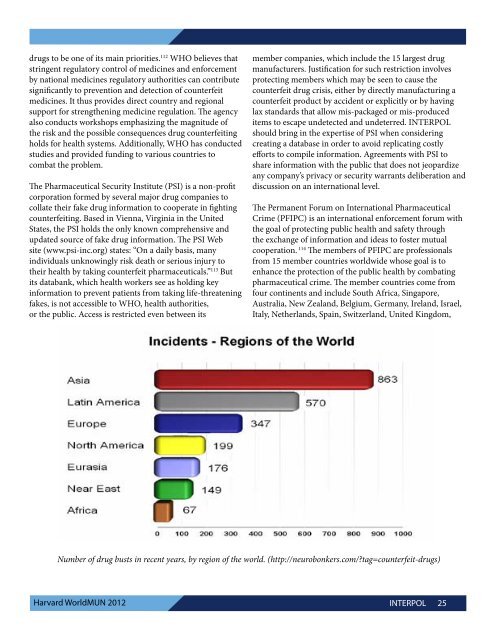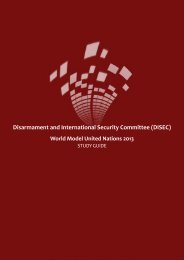INTERPOL - World Model United Nations
INTERPOL - World Model United Nations
INTERPOL - World Model United Nations
You also want an ePaper? Increase the reach of your titles
YUMPU automatically turns print PDFs into web optimized ePapers that Google loves.
drugs to be one of its main priorities. 112 WHO believes that<br />
stringent regulatory control of medicines and enforcement<br />
by national medicines regulatory authorities can contribute<br />
signicantly to prevention and detection of counterfeit<br />
medicines. It thus provides direct country and regional<br />
support for strengthening medicine regulation. e agency<br />
also conducts workshops emphasizing the magnitude of<br />
the risk and the possible consequences drug counterfeiting<br />
holds for health systems. Additionally, WHO has conducted<br />
studies and provided funding to various countries to<br />
combat the problem.<br />
e Pharmaceutical Security Institute (PSI) is a non-prot<br />
corporation formed by several major drug companies to<br />
collate their fake drug information to cooperate in ghting<br />
counterfeiting. Based in Vienna, Virginia in the <strong>United</strong><br />
States, the PSI holds the only known comprehensive and<br />
updated source of fake drug information. e PSI Web<br />
site (www.psi-inc.org) states: “On a daily basis, many<br />
individuals unknowingly risk death or serious injury to<br />
their health by taking counterfeit pharmaceuticals.” 113 But<br />
its databank, which health workers see as holding key<br />
information to prevent patients from taking life-threatening<br />
fakes, is not accessible to WHO, health authorities,<br />
or the public. Access is restricted even between its<br />
member companies, which include the 15 largest drug<br />
manufacturers. Justication for such restriction involves<br />
protecting members which may be seen to cause the<br />
counterfeit drug crisis, either by directly manufacturing a<br />
counterfeit product by accident or explicitly or by having<br />
lax standards that allow mis-packaged or mis-produced<br />
items to escape undetected and undeterred. <strong>INTERPOL</strong><br />
should bring in the expertise of PSI when considering<br />
creating a database in order to avoid replicating costly<br />
eorts to compile information. Agreements with PSI to<br />
share information with the public that does not jeopardize<br />
any company’s privacy or security warrants deliberation and<br />
discussion on an international level.<br />
e Permanent Forum on International Pharmaceutical<br />
Crime (PFIPC) is an international enforcement forum with<br />
the goal of protecting public health and safety through<br />
the exchange of information and ideas to foster mutual<br />
cooperation. 114 e members of PFIPC are professionals<br />
from 15 member countries worldwide whose goal is to<br />
enhance the protection of the public health by combating<br />
pharmaceutical crime. e member countries come from<br />
four continents and include South Africa, Singapore,<br />
Australia, New Zealand, Belgium, Germany, Ireland, Israel,<br />
Italy, Netherlands, Spain, Switzerland, <strong>United</strong> Kingdom,<br />
Number of drug busts in recent years, by region of the world. (http://neurobonkers.com/?tag=counterfeit-drugs)<br />
Harvard <strong>World</strong>MUN 2012 <strong>INTERPOL</strong> 25

















